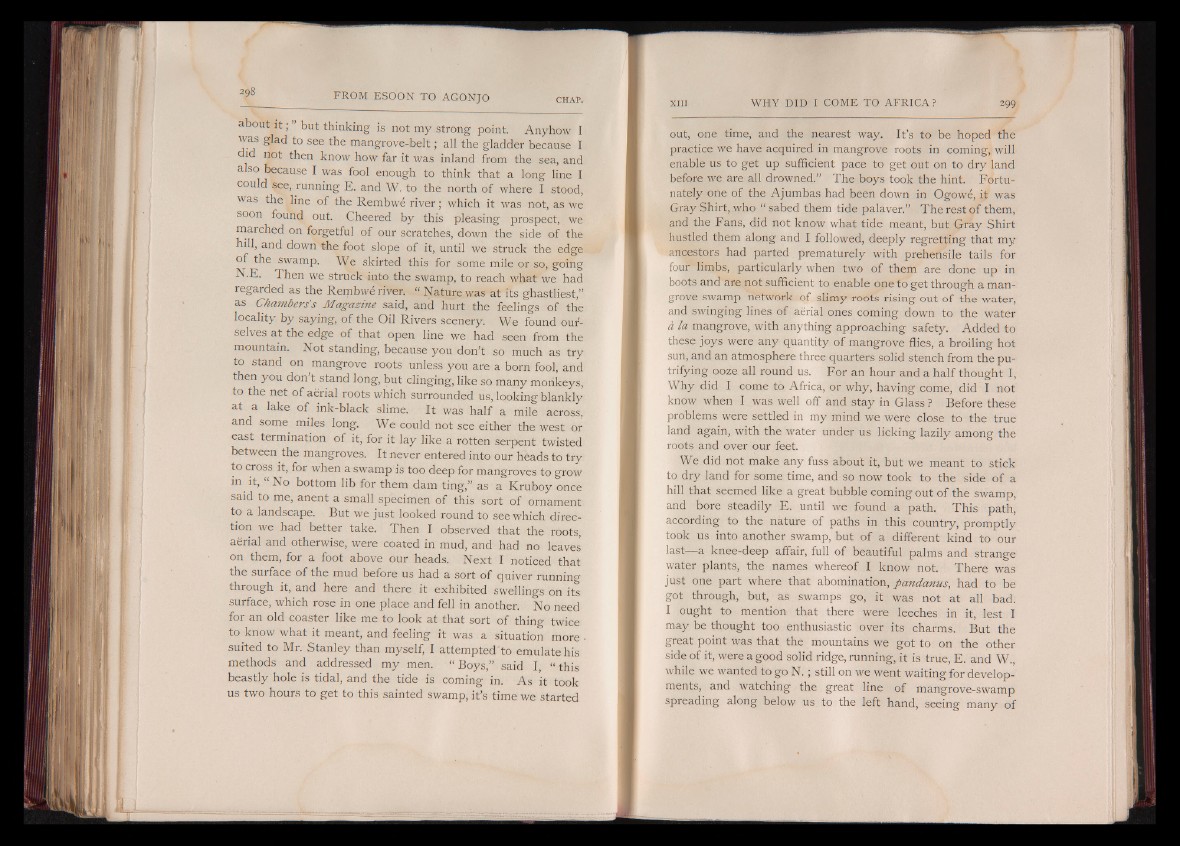
about i t ; ” but thinking is not my strong point. Anyhow I
j a s glad to see the mangrove-belt; all the gladder because I
did not then know how far it was inland from the sea, and
also because I was fool enough to think that a long line I
could see, running E. and W. to the north of where I stood,
was the line of the Rembwd river; which it was not, as we
soon found out. Cheered by this pleasing prospect, we
marched on forgetful of our scratches, down the side of the
hill, and down the foot slope of it, until we struck the edge
of the swamp. We skirted this for some mile or so, going
N.E. Then we struck into the swamp, to reach what we had
regarded as the Rembwe river. “ Nature was at its ghastliest,”
as Chambers's Magazine said, and hurt the feelings of the
locality by saying, of the Oil Rivers scenery. We found ourselves
at the edge of that open line we had seen from the
mountain. Not standing, because you don’t so much as try
to stand on mangrove roots unless you are a born fool, and
then you don t stand long, but clinging, like so many monkeys,
to the net of aerial roots which surrounded us, looking blankly
at a lake of ink-black slime. It was half a mile across,
and some miles long. We could not see either the west or
east termination of it, for it lay like a rotten serpent twisted
between the mangroves. It never entered into our heads to try
to cross it, for when a swamp is too deep for mangroves to grow
in it, “ No bottom lib for them dam ting,” as a Kruboy once
said to me, anent a small specimen of this sort of ornament
to a landscape. But we just looked round to see which direction
we had better take. Then I observed that the roots,
aerial and otherwise, were coated in mud, and had no leaves
on them, for a foot above our heads. Next I noticed that
the surface of the mud before us had a sort of Quiver running
through it, and here and there it exhibited swellings on its
surface, which rose in one place and fell in another. No need
for an old coaster like me to look at that sort of thing twice
to know what it meant, and feeling it was a situation more ■
suited to Mr. Stanley than myself, I attempted to emulate his
methods and addressed my men. “ Boys,” said I, “ this
beastly hole is tidal, and the tide is coming in. As it took
us two hours to get to this sainted swamp, it’s time we started
out, one time, and the nearest way. It’s to be hoped the
practice we have acquired in mangrove roots in coming, will
enable us to get up sufficient pace to get out on to dry land
before we. are all drowned.” The boys took the hint. Fortunately
one of the Ajumbas had been down in Ogowe, it was
Gray Shirt, who “ sabed them tide palaver.” The rest of them,
and the Fans, did not know what tide meant, but Gray Shirt
hustled them along and I followed, deeply regretting that my
ancestors had parted prematurely with prehensile tails for
four limbs, particularly when two of them are done up in
boots and are not sufficient to enable one to get through a mangrove
swamp network of slimy roots rising out of the water,
and swinging lines of aerial ones coming down to the water
a, la mangrove, with anything approaching safety. Added to
these joys were any quantity of mangrove flies, a broiling hot
sun, and an atmosphere three quarters solid stench from the pu-
trifying ooze all round us. For an hour and a half thought I,
Why did I come to Africa, or why, having come, did I not
know when I was well off and stay in Glass ? Before these
problems were settled in my mind we were close to the true
land again, with the water under us licking lazily among the
roots and over our feet.
We did not make any fuss about it, but we meant to stick
to dry land for some time, and so now took to the side of a
hill that seemed like a great bubble coming out of the swamp,
and bore steadily E. until we found a path. This path,
according to the nature of paths in this country, promptly
took us into another swamp, but of a different kind to our
last— a knee-deep affair, full of beautiful palms and strange
water plants, the names whereof I know not. There was
just one part where that abomination, pandanus, had to be
got through, but, as swamps go, it was not at all bad.
I ought to mention that there were leeches in it, lest I
may be thought too enthusiastic over its charms. But the
great point was that the mountains we got to on the other
side of it, were a good solid ridge, running, it is true, E. and W.,
while we wanted to go N .; still on we went waiting for developments,
and watching the great line of mangrove-swamp
spreading along below us to the left hand, seeing many of